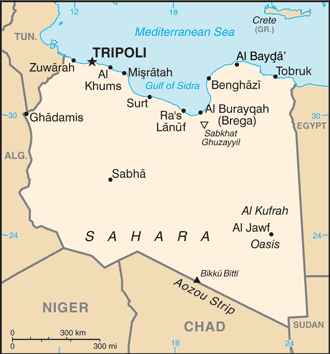 Washington, DC–(ENEWSPF)–January 20, 2015. The Department of State warns U.S. citizens against all travel to Libya and recommends that U.S. citizens currently in Libya depart immediately. On July 26, the U.S. Embassy suspended all embassy operations in Libya and relocated staff, due to ongoing violence between Libyan militias in the immediate vicinity of the Embassy. This Travel Warning supersedes the Travel Warning issued on July 26, 2014.
Washington, DC–(ENEWSPF)–January 20, 2015. The Department of State warns U.S. citizens against all travel to Libya and recommends that U.S. citizens currently in Libya depart immediately. On July 26, the U.S. Embassy suspended all embassy operations in Libya and relocated staff, due to ongoing violence between Libyan militias in the immediate vicinity of the Embassy. This Travel Warning supersedes the Travel Warning issued on July 26, 2014.
Please direct inquiries regarding U.S. citizens in Libya to [email protected]. Callers in the United States and Canada may dial the toll free number 1-888-407-4747. Callers outside the United States and Canada may dial 1-202-501-4444.
The security situation in Libya remains unpredictable and unstable. The Libyan government has not been able to adequately build its military and police forces and improve security following the 2011 revolution. Many military-grade weapons remain in the hands of private individuals, including antiaircraft weapons that may be used against civilian aviation. Crime levels remain high in many parts of the country. In addition to the threat of crime, various groups have called for attacks against U.S. citizens and U.S. interests in Libya. Extremist groups in Libya have made several specific threats against U.S. government officials, citizens, and interests in Libya. Because of the presumption that foreigners, especially U.S. citizens, in Libya may be associated with the U.S. government or U.S. Non-governmental organizations (NGOs), travelers should be aware that they may be targeted for kidnapping, violent attacks, or death. U.S. citizens currently in Libya should exercise extreme caution and depart immediately.
The internationally recognized House of Representatives has relocated to Tobruk, and its government is based in Bayda. Government authorities lack control over much of the country. Tripoli and its environs are controlled by a coalition of militias known as Operation Dawn, and affiliated authorities calling themselves the “National Salvation Government.”
Clashes are ongoing throughout the country and attacks by armed groups can occur in many different areas. Hotels frequented by westerners have been caught in the crossfire. Checkpoints controlled by militias are common outside of Tripoli, as well as inside the capital at times. Most international airports are closed, and flights out of operational airports are sporadic and may be cancelled without warning. The United States is very concerned about the targeting of commercial transportation in Libya. The U.S. government prohibits U.S. commercial aviation operations within Libyan airspace.
Along with airports, seaports and roads can close with little or no warning. The Libyan National Army announced on January 7, 2015 that all vessels in Libyan waters require army approval for transit, following the January 4, 2015 bombing of a Greek-operated oil tanker near Derna, Libya, that killed two crewmen. The escalation of violence in Libya against civilian commercial interests raises serious concerns about the safety of maritime vessels and their crew. U.S. mariners are advised to exercise extreme caution while transiting in or near Libyan territorial waters. Vessels are advised to proceed with extreme caution when approaching all Libyan oil terminals and ports and are encouraged to adhere to the recommendations in the U.S. Coast Guard’s Port Security Advisory 1-14 issued April 1, 2014. Mariners planning travel to Libya should check the U.S. Coast Guard Homeport Website for any Port Security Advisory Updates (HTTPS://HOMEPORT.USCG.MIL),and the NGA Broadcast Warnings Website select “Broadcast Warnings”) for any special warnings or Maritime Administration Advisories before arrival.
U.S. citizens still in Libya should make plans to depart as soon as possible. U.S. citizens seeking to depart Libya are responsible for making their own travel arrangements. Travelers should reconfirm flight schedules with their airline prior to going to the airport. Flight cancellations occur frequently. There are no plans for charter flights or other U.S. government-sponsored evacuations. Land port closures occur frequently.
U.S. citizens should avoid areas of demonstrations and exercise caution if in the vicinity of any large gatherings, protests, or demonstrations, as even demonstrations intended to be peaceful can turn confrontational and escalate into violence. U.S. citizens traveling to or remaining in Libya, despite this Travel Warning, should use caution and limit nonessential travel within the country, make their own contingency emergency plans, and maintain security awareness at all times.
We strongly recommend that U.S. citizens traveling to or residing in Libya enroll in the Department of State’s Smart Traveler Enrollment Program (STEP). STEP enrollment gives you the latest security updates and makes it easier to contact you in an emergency. If you don’t have internet access, enroll directly with the nearest U.S. embassy or consulate.
The Embassy’s website includes consular information and the most recent messages for U.S. citizens in Libya.
For information on “What the Department of State Can and Can’t Do in a Crisis,” please visit the Bureau of Consular Affairs’ Emergencies and Crisis link. Up-to-date information on security can also be obtained by calling 1-888-407-4747 toll-free in the United States and Canada or, for callers outside the United States and Canada, on a regular toll line at 1-202-501-4444. These numbers are available from 8:00 a.m. to 8:00 p.m. Eastern Daylight Time, Monday through Friday (except U.S. federal holidays).
For further information, U.S. citizens should consult the Department of State’s Country Specific Information. Stay up to date by bookmarking our Bureau of Consular Affairs website, which contains the current Travel Warnings and Travel Alerts as well as the Worldwide Caution. Follow us on Twitter and the Bureau of Consular Affairs page on Facebook as well.
Source: state.gov








